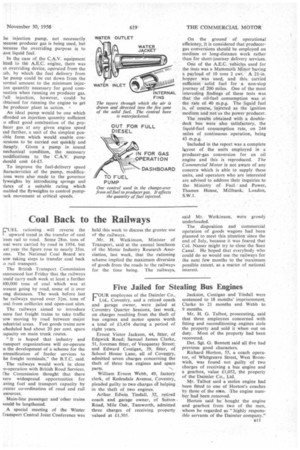Coal Back to the Railways
Page 45

If you've noticed an error in this article please click here to report it so we can fix it.
L'ILJEL rationing . will reverse the L upward trend in the transfer of coal :nom rail to road. Some 28m. tons of ;oat were carried by road in 1954, but ast year the figure rose to nearly 35m. ons. The National Coal Board are tow taking steps to transfer coal back o -rail transport, The British Transport Commission tnnounced last Friday that the railways :ould carry each week at least a further 100,000 tons of coal which was at aresent going by road, some of it over ong distances. The week before last he railways moved over 31m. tons of :oat from collieries and open-cast sites, The railways aimed to introduce nore fast freight trains to take traffic tow moving by road between major ndustrial areas. Fast goods trains now ,cheduled had about 20 per cent, spare :apacity on main trunk routes.
"It is hoped that industry and ransport organizations will co-operate n the development of a scheme for the ntensification of feeder services to he freight terminals," the B.T.C. said.
The railways would work in close :0-operation with British Road Services, the Commission thought that there vere widespread opportunities for aving fuel and transport capacity by ireater co-ordination of road and rail esources.
Main-line passenger and 'other trains vould be lengthened.
A special meeting of the Winter transport Central Joint Conference was held this week to discuss the greater use of the railways.
.Mr. H. Watkinson, Minister of Transport, said at the annual luncheon of the Motor Industry Research Association, last week, that the rationing scheme implied the maximum diversion of goods from the roads to the railways for the time being. The railways,
said Mr. Watkinson, were grossly underloaded.
The disposition and commercial operation of goods wagons had been planned to meet this situation since the end of July, because it was feared that Col. Nasser might try to close the Suez Canal. He hoped that everybody who could do so would use-the railways for the next few months to the maximum possible extent, as a matter of national interest.




























































































